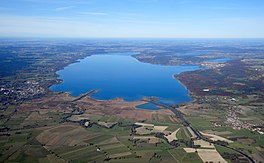| Ammersee Lake Ammer | |
|---|---|
 Aerial view of the Ammersee from the south | |
| Location | Upper Bavaria |
| Coordinates | 48°00′N 11°07′E / 48.000°N 11.117°E |
| Primary inflows | River Ammer |
| Primary outflows | Amper |
| Catchment area | 993.0 km2 (383.4 sq mi) |
| Basin countries | Germany |
| Max. length | 16.2 km (10.1 mi) |
| Max. width | 5 km (3.1 mi) |
| Surface area | 46.6 km2 (18.0 sq mi) |
| Average depth | 37.8 m (124 ft) |
| Max. depth | 81 m (266 ft) |
| Residence time | 2.7 years |
| Surface elevation | 533 m (1,749 ft) |
| Islands | Schwedeninsel |
| Settlements | Herrsching, Dießen am Ammersee, Schondorf, Breitbrunn, Utting, Buch, Riederau, Eching, Inning |
| Designated | 26 February 1976 |
| Reference no. | 93[1] |
Ammersee (English: Lake Ammer) is a Zungenbecken lake in Upper Bavaria, Germany, southwest of Munich between the towns of Herrsching and Dießen am Ammersee. With a surface area of approximately 47 square kilometres (18 sq mi), it is the sixth largest lake in Germany. The lake is at an elevation of 533 metres (1,749 ft), and has a maximum depth of 81 metres (266 ft). Like other Bavarian lakes, Ammersee developed as a result of the ice age glaciers melting. Ammersee is fed by the River Ammer, which flows as the Amper out of the lake. Like neighbouring Lake Starnberg - deeper, bigger in surface area, similar in shape - it is a popular location for watersports.
Ammersee and the Amper are part of the ancient Celtic amber trading route leading to the Brenner Pass. The word Ammer is a 13th-century form of Amper, the Celtic *ambra, deriving from the Indo-European *ombh-, *mbh- "wet, Water".[2]
Passenger services have operated on the lake since 1879. Today they are operated by the Bayerische Seenschifffahrt company, using a mixture of historic paddle steamers and motor ships.[3][4]
- ^ "Ammersee". Ramsar Sites Information Service. Retrieved 25 April 2018.
- ^ Dieter Berger: Duden - Geographische Namen in Deutschland. 2nd ed., Dudenverlag, 1999, ISBN 978-3-411-06252-2.
- ^ "Bayerische Seenschifffahrt". Bayerische Seenschifffahrt. Archived from the original on 2011-07-16. Retrieved 11 July 2011.
- ^ "Geschichtliche Hintergründe" [Historical Background] (in German). Bayerische Seenschifffahrt. Archived from the original on 10 December 2011. Retrieved 11 July 2011.
